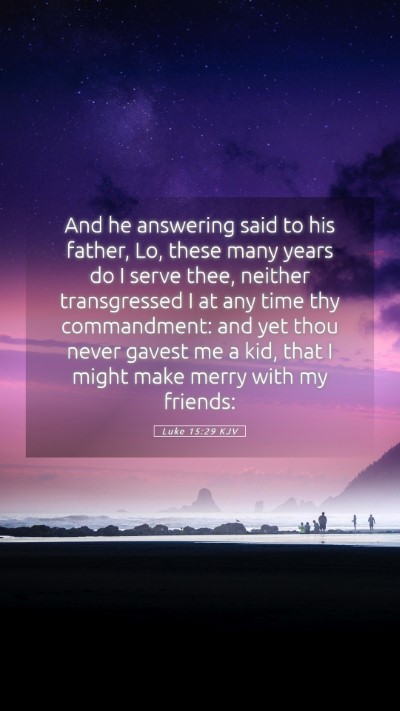Bible Verse Meaning of Luke 15:29
Luke 15:29 states: "And he answering said to his father, Lo, these many years do I serve thee, neither transgressed I at any time thy commandment: and yet thou never gavest me a kid, that I might make merry with my friends." This verse is part of the parable of the Prodigal Son, illustrating deep themes of resentment and misunderstanding in familial love and a sense of entitlement.
Contextual Overview
This verse comes from a larger narrative in Luke 15, where Jesus tells the story of two sons. This particular part highlights the feelings of the elder son who has remained faithful yet feels overlooked and underappreciated. This tension serves as a powerful commentary on human emotions regarding obedience, reward, and familial relationships.
Interpretation and Analysis
The meaning of this verse can be understood through various lenses:
- Entitlement vs. Generosity: The elder son’s declaration of his years of service demonstrates a sense of entitlement. He equates his obedience with reward, illustrating a common human expectation of fairness in relationships.
- Resentment: Here, the elder son expresses resentment because, despite his loyalty, he feels that his father has not recognized him or rewarded him adequately. This speaks to the emotional dynamics within families, where one member's faithfulness may lead to a belief that they deserve special treatment.
- Unrecognized Love: The father's actions suggest that love should not be quantified based on material gifts or celebrations. The father expresses unconditional love towards both sons, indicating that joy should be shared rather than comparing achievements.
- Comparative Righteousness: The elder brother's viewpoint represents a form of comparative righteousness—he sees himself as better than his wayward brother. This illustrates a pitfall in spiritual life, where one might find pride in moral standing as opposed to the joy of reconciliation.
Insights from Commentaries
Matthew Henry's Commentary
Matthew Henry remarks on the elder son's faithfulness and the tragic misunderstanding of his father's love. His commitment to work and obedience should have brought him closer to his father, yet it instead breeds a sense of bitterness. Henry emphasizes that divine grace is not something we earn; it is a gift given freely by the Father.
Albert Barnes' Notes on the Bible
Albert Barnes points out that the elder brother’s complaint reflects a broader human attitude—feeling overlooked when others who may appear to have strayed are embraced by grace and mercy. Barnes underscores that such feelings can lead to spiritual alienation, where one may abide in proximity to God yet be distant in heart.
Adam Clarke's Commentary
Adam Clarke adds a layer of historical and cultural context, noting that the elder son’s reference to a "kid" (young goat) signifies a coveted and festive celebration, common in Jewish tradition for expressing joy. Clarke emphasizes the cultural significance of celebratory meals, reinforcing that the elder son feels deprived of a communal joy that should have been shared with him.
Cross References
- Luke 15:11-32 - The Parable of the Prodigal Son, providing the full context of the family dynamics.
- Matthew 20:1-16 - The parable of the workers in the vineyard, illustrating God's grace to all, regardless of their perceived worthiness.
- Romans 3:23 - “For all have sinned, and come short of the glory of God,” highlighting the universality of grace.
- Galatians 5:26 - A reminder against provoking one another or being envious, relevant to the elder son's feelings.
Applying the Verse to Daily Life
This verse serves as a lens through which we can examine our own lives and relationships:
- Reflect on Expectations: Are there areas in your life where you feel entitled to rewards based on your faithfulness or service? It’s essential to recognize that grace is not transactional.
- Practice Gratitude: Instead of focusing on what you feel is lacking, consider expressing gratitude for the blessings present in your life and the lives of others.
- Embrace Forgiveness and Reconciliation: Foster humility and seek to celebrate others’ successes as their journeys are also part of God's plan.
Conclusion
In conclusion, Luke 15:29 provides rich terrain for Bible verse meanings and interpretations. It delves into complex emotions of loyalty, resentment, and the nature of divine grace. Engaging with this text through various Bible study tools and insights from renowned commentators offers profound depths for Bible study groups and personal reflections alike.


